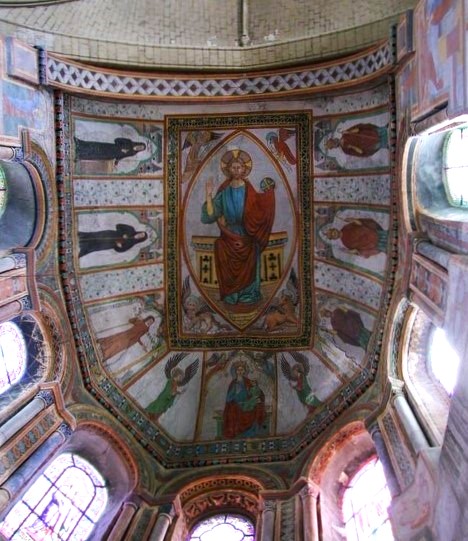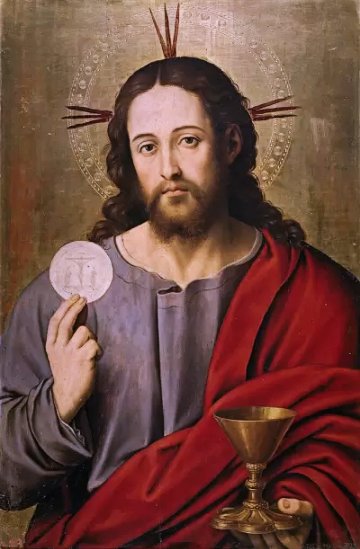Question 58
What does “give us this day our daily bread” mean?
When we pray, Give us this day our daily bread, the word this day, means this present time, in which we ask for all that makes up temporal blessings…and bread, means the sacrament of believers, which in this present time is necessary in order to obtain this felicity – not in the present time – but in eternity.
from St. Augustine Answers 101 Questions on Prayer by Fr. Ermatinger
 Fresco on Dome of Apse Above Main Altar, Sainte Radegonde Church, France
Fresco on Dome of Apse Above Main Altar, Sainte Radegonde Church, France
As man is both body and spirit, so to then are the concerns that he prays for. While he must not tend to the concerns of his body at the expense of the concerns of his soul, he is not an angel who has no concern for bodily things. He must eat. He must sleep. He must exercise and put to trial the flesh of his body and mind. Even as these things are tended to, they are mortified; for penance, for purification, for conforming the body to the soul, which must by need govern the body in all things.
Man’s bodily concern is for the sustaining of his body, the concern of which is scripturally depicted as bread. There is something deeper going on here because what is prayed for is nothing that can be found in nature. The prayer is not for fruit, grass, nor meat, all of which can be found throughout the world. There is no bread tree, no bread that springs from the earth, no bread that grazes upon the savannas. Bread must be made. It is a product of man’s labor; of his cultivation of the good things of this world and the refining, mixing, and kneading of his hands. Bread is an artisan product of man’s labor; something of himself goes into each loaf. And bread is still something more for it is the reward for his labor; he is fed by it, sustained by it, grows strong by it.
In the prayer for bread are the complexities of the human condition as well as its dignity. The prayer for bread is so much more than a prayer for something to eat; it is a prayer that he might have the labor of his purpose, that the labor might be fruitful, that he might be rewarded for his labor, and that this reward might bring him new life. This bread is both given unto him from above and a product of his labor.
The sojourn of man’s life is in to-day, not yester-day, or to-morrow. Yesterday he was not, today he works, tomorrow he hopes to rest. He is spent today, rent today, formed today. (Herein is a subtle warning to build up treasure in heaven rather than here on earth for the work of his formation will one day cease.) The concerns of man’s body are for today, for a day that passes like a sigh, like a shadow, like the shuttlecock of a weaver. For all the transitory nature of today it is still real and not a dream. What is done today echoes in eternity. The prayer for today is for the growth of life, for even as the grass that wilts in the evening it has grown and flowered during the day. The prayer for today dignifies the day, hallows it, and places man’s trust in God by not being concerned about tomorrow. God will attend to that, what is important is the now of the laborer in the vineyard of the Lord; the concerns for daily work and reward that ever sustains and ever draws man onward towards his end, towards his rest.
Man’s spiritual concern is for the good of his soul. The soul desires beauty, truth goodness, to know and to be known. It desires the life of virtue and ever seeks after wisdom. Yet, these lofty things man was not made for; he was made to have a supernatural end, to find the desire of His soul in God and in God alone. Man’s soul was made in God’s image and the Image of God desires to ever cleave to God her Creator. My bread is to do the will of the Father (cfr. John 4:34), as the God-Man Jesus replied. This is the spiritual work and reward of man who is called to participate in this very life of the Father by being joined to Jesus, the Son, through the indwelling of the Holy Spirit. The work, the reward, the participation, the accomplished will of the Father.
As the bread of the work of the body is real bread indeed, the bread of the work of the spirit is real spiritual food indeed – it is a true indwelling and participation in the Divine Life. As man is not pure spirit but a composite of both body and soul, this great mysterium tremendum, this great sacrament, feeds both body and soul and is true food indeed. It is the God-Man’s own very life given in ransom for those still in the world. What comes to us as the great sacrament of His Body and Blood comes to us truly spiritually and truly corporally, bread and wine transubstantiated into the fullness of Him; body, blood, soul, and divinity, the totality of the ever-living person of Jesus is received as food for the soul and body; the total human person.
Man’s body longs for the rest of tomorrow but his soul longs for the Day of the Lord, which is not tomorrow but rather the eschatological this day of the eternal now of God. The prayer for the spiritual bread today is a prayer for the inbreaking of the eschaton into the middle of time; that the rest of the eschatological final-morrow happens today. Such is the magnanimity of the Father that the Son should teach us to pray for this great largesse, a miracle that is indeed provided for and granted to those who so pray.
The work that the Father commands for us to do is to receive Christ, both in ourselves and in our neighbor. For man, the reward of doing the will of the Father is to receive Christ. Christ is our work and our rest; our labor and our bread. Today is this present moment that has been eschatologicized and has become the ever now of the Father’s own eternity.
The prayer for our daily bread is the prayer for God’s greatest good thing; Himself, now in the Eucharist and eschatologically face to Face.
– PPP


 Christ the Savior with the Eucharist, Juan de Juanes, ca 1545-1550.
Christ the Savior with the Eucharist, Juan de Juanes, ca 1545-1550.